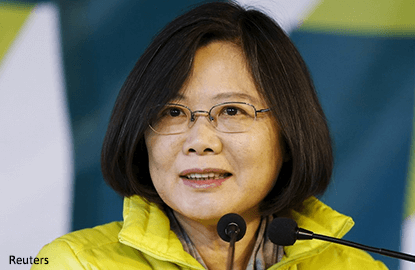
TAIPEI, Taiwan (May 20): Taiwan is set to promote its “new southbound policy” that aims to elevate the scope and diversity of its external economy, bidding farewell to its past over-reliance on a single market, according to its new president Tsai Ing-wen.
In her highly-anticipated inaugural speech, Tsai highlighted that the new administration of Taiwan will broaden exchanges and cooperation with regional neighbours in areas such as technology, culture and commerce, and expand in particular its dynamic relationships with Asean and India.
"We will share resources, talents and markets with other countries to achieve economies of scale and to allow the efficient use of resources. This is the spirit on which our new southbound policy is based," she said at the inauguration ceremony of the 14th President and Vice President of Taiwan here today. Tsai is Taiwan's first female president.
Tsai stressed that the only way for Taiwan to overcome the current economic stagnation is to stimulate new momentum for growth.
"Our export and domestic demand will serve as twin engines for growth, allowing business production to become closely integrated with the livelihoods of the people, while building close ties between foreign trade and the local economy," she said.
Tsai's economic policies aim to bolster the nation's competitiveness by shifting from an efficiency-driven economic model to an innovation-driven one.
The "Little Ing", as Tsai is known to her supporters, also said she plans to pursue export diversification and membership in the Trans-Pacific Partnership (TPP).
Taiwan is currently not a member of the 12-member trade pact, which comprises the U.S., Japan, Malaysia, Vietnam, Singapore, Brunei, Australia, New Zealand, Canada, Mexico, Chile and Peru.
To rejuvenate the economy, Taiwan has identified five major innovative industries, including biotechnology, national defence, Internet of Things, green energy and precision machinery.
"Our energy and resources are limited, and our economy lacks momentum, with the old model of OEM manufacturing facing a bottleneck. Taiwan urgently needs a new model for economic development," said Tsai.
In order to completely transform Taiwan’s economy, it must "bravely" chart a different course, she said.
"The first step of reform is to strengthen the vitality and autonomy of our economy, reinforce Taiwan’s global and regional connections, and actively participate in multilateral and bilateral economic cooperation, as well as free trade negotiations, including the TPP and the Regional Comprehensive Economic Partnership," said Tsai.
"We will also bring Taiwan into an age of circular economy, turning waste into renewable resources. We will gradually adjust our energy options, based on the concepts of sustainability," she added.
Describing the present stage of Taiwan’s economic development as highly connected and complementary to many countries in the region, Tsai opined if Taiwan's economic development can be linked to other Asian and Asia-Pacific countries through cooperation to jointly shape future development strategies, it will contribute to the region’s innovation, structural adjustment and sustainable development.
"Together with other members of this region, we will forge an intimate sense of economic community," she said.